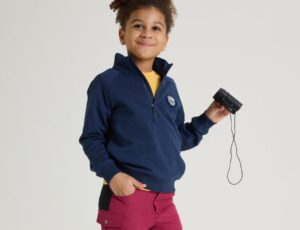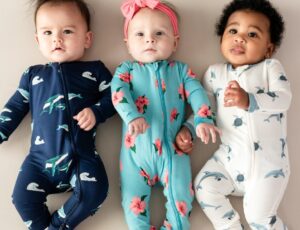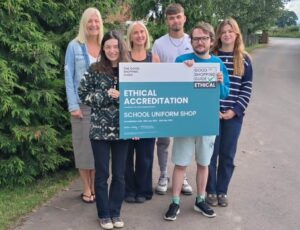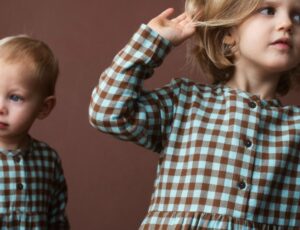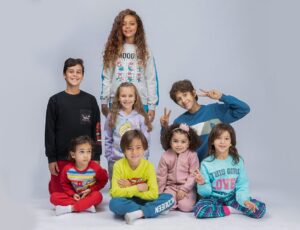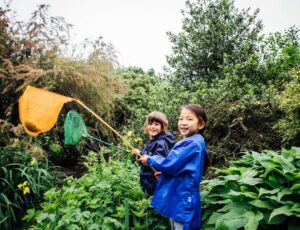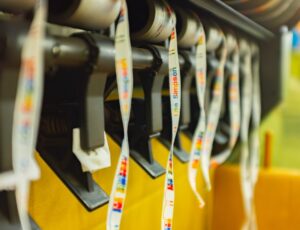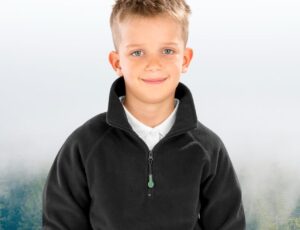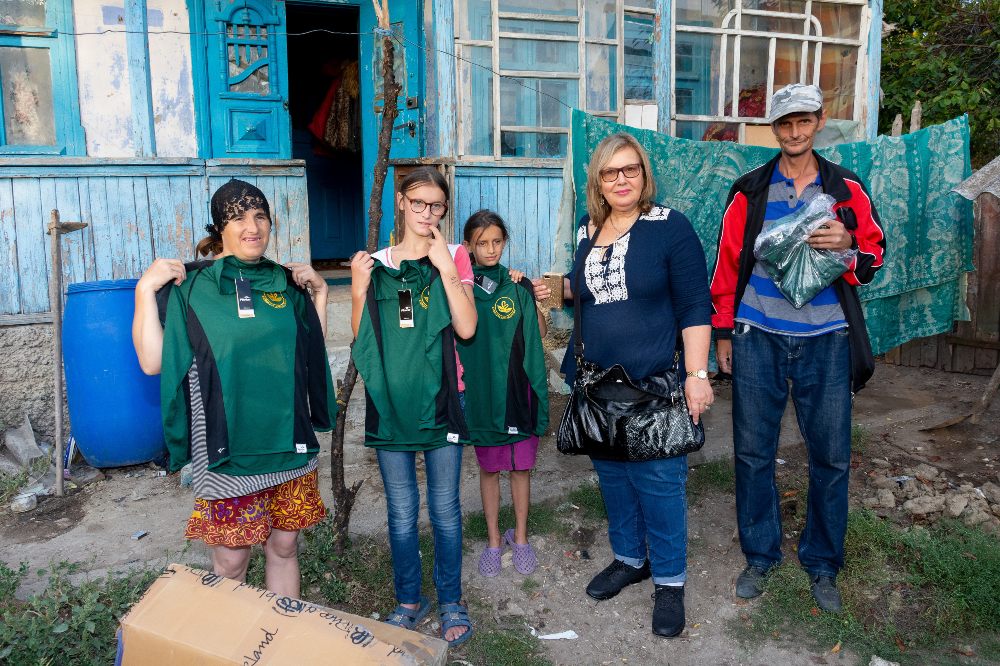
As UK registered charity Goods For Good celebrates its 10th anniversary, CWB speaks to its founder, Rosalind Bluestone MBE, to learn more about the organisation, how it works with the childrenswear industry, and what the vision is for the charity’s future.
Laura Turner: How did you get into the charity sector?
Rosalind Bluestone: Some people have career plans for years and years, and while I hadn’t dreamt of working in the charity sector, I have always volunteered from an early age. During school I volunteered with the elderly and deprived children in Camden, and later for a charity committee putting on events. I have always worked and had numerous roles. When I returned from working overseas, I saw a job advertised for a London-based charity with a focus on relieving poverty in Soviet Union countries. The charity was looking for someone with export experience, which I had, to distribute goods from the UK to places like Ukraine, Belarus, Moldova and Serbia. I applied, got the job, and fell into the charity sector at the age of 48. I loved it, but once I travelled to those countries and saw the abject poverty, it became life-changing. My whole world altered after seeing the deprivation and poverty of those families.
LT: What motivated you to start Goods For Good?
RB: Twelve years later, just before my 60th birthday, I was made redundant from the charity I worked for. I wasn’t ready to retire, I still had work to do, and couldn’t let these people down: families without nappies for their babies, without coats and blankets for the winter, without shoes for their children. I needed to find a way to continue what I’d been doing, but when you’ve been dealing with the volume of goods that I had at the previous charity – we’d exported over £33 million of unwanted goods in 12 years – I knew exactly what the costs were to run such an operation and it’s a big budget. I was very lucky that a Dutch charity I’d worked with in my previous role approached me about setting up an independent organisation to continue my work. It’s a registered charity in Holland, and it also runs a logistics company and has a big warehouse near Amsterdam. I put a business plan together and started ringing my contacts to propose the plan and they were all happy to continue supplying me with their overstocks for repurposing. I began setting up Goods For Good in the summer of 2014, initially as a CIC, and by February 2016 we’d completed the lengthy process of becoming a registered charity. I worked for three and a half years on my own and managed to get a unit donated in Borehamwood, Hertfordshire. We had a little office and unit that we shared with another charity and that’s how we made it work. Originally when we set up, and historically, our work was all international, but our trustees and I were keen to do something at home too. When you look at the poverty in the UK it is astounding – there are 4.2 million children in need in the UK. We started off working with 12 registered UK charities, supplying them with goods for them to distribute to their beneficiaries. During Covid, we linked up with several new organisations to reach out and support NHS workers, asylum seekers and refugees. Today we work with 112 charities to which we supply goods.
LT: How would you define Goods For Good’s mission?
RB: Goods For Good helps vulnerable individuals by supplying them with essential items such as everyday clothing, footwear and bedding. We are a tiny organisation with a big impact, delivering hope and dignity for humanity. To date, we have delivered £53 million of overstocked goods, so we are also a charity that helps save our planet from CO2 emissions by diverting goods going to landfill.
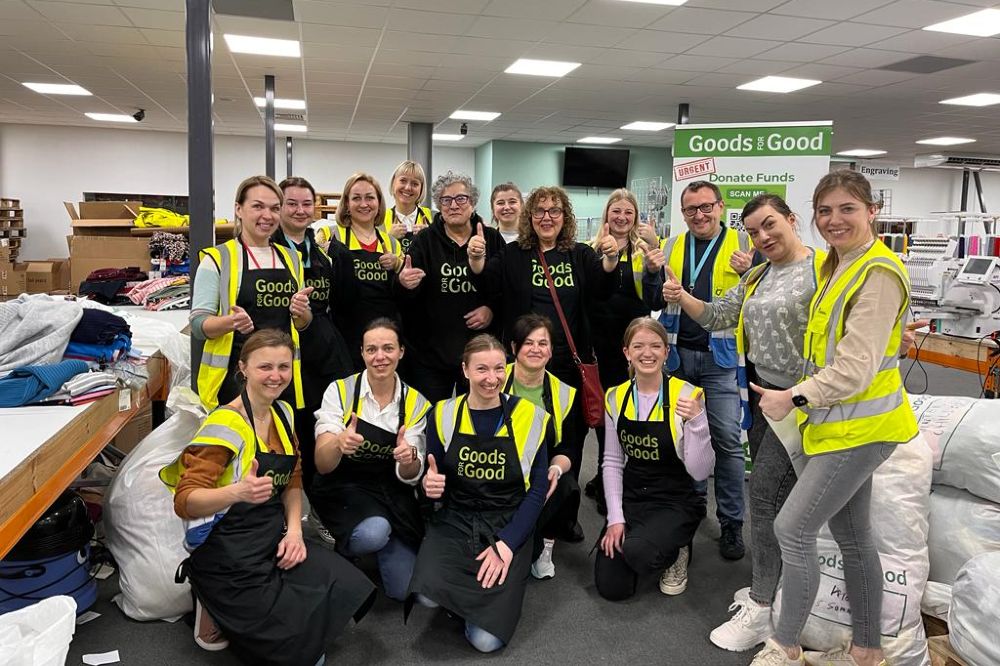
LT: What goods do you deal with?
RB: Clothing, footwear and accessories such as hats, gloves, scarves and thermals. Also, nappies, bedding, and hygiene and sanitary goods. We are desperate for everyday children’s footwear and clothing items, which can include schoolwear, and we require both lightweight and more heavy-duty garments depending on the recipients’ climate. We attended The Schoolwear Show in 2022, which resulted in around 45 companies approaching us. Many of them have since sent us goods, with some having sat on stock for up to five years if a school logo had changed and they didn’t have anywhere to repurpose the garments. If a company says the goods need to go overseas, we have charity partners overseas that need them, and we can make sure they don’t go to landfill. We also have the capacity to pick up in Europe through our links with the Dutch charity. I think having this facility and not just being UK-based is what has made our charity so successful. It would be great to attend other trade shows and connect with more childrenswear companies.
LT: Can you give examples of how companies currently help you?
RB: Among those that support us hugely is the online childrenswear retailer My 1st Years. I worked with the team for many years with my previous charity, and during the Ukraine war, they stepped forward and asked what they could do to help. We had so many companies contacting us offering goods, but we didn’t have the space to take them all. My 1st Years helped us massively by offering us warehouse space and taking an inventory of a huge volume of goods, sending them out to the different hubs we’d set up with our Dutch charity partner to go directly to Ukraine, Moldova, Poland and Romania. My 1st Years is now on a mission with us to clothe one million children and it also makes a financial donation to Goods For Good with every sale. As a result of the work My 1st Years has been doing with us its sales have increased, because as well as providing great products and service, it’s helping a charity to clothe children in need. We would love to get more companies like My 1st Years on board. Historically, The Dune Group has also helped us for a long time, providing warehouse space and small logistics. When the company’s vans are empty from delivering to its stores, it does our pick-ups for us, takes them to its warehouse, and then to My 1st Years in Northampton, which is our main hub now. We have also been working with UNIQLO since 2018, and during this time it has supported us in several ways, from donating both new and pre-loved garments from its UK and Dutch warehouses to volunteering with us to sort and pack items before they are delivered. A few months after the Ukrainian war started, we took a UNIQLO delegation out to the Polish border, where Uniqlo’s Head of Sustainability, Maria Ledous, was amongst those who distributed essential goods to evacuees who had lost everything.
LT: What are your ambitions for the charity?
RB: We are a very small team, which I want to increase because we are only scratching the surface. There are so many companies we haven’t approached that may have surplus stock that we can repurpose. Fundraising is very difficult and competitive for charities, so we encourage corporates we get on board to sign up for Humanitarian Aid Partnership via our website, which helps us build a relationship and work as a team. By joining our Humanitarian Aid Partnership and becoming a Goods For Good Aid Partner, companies can become an integral part of a team that is working to transform lives and break cycles of poverty around the world. There are several ways companies can partner with us, whether that’s financial support, donating unsold goods, or volunteering time or expertise, they can help us achieve a more meaningful impact at scale. This also ticks ESG and CSR policies and enables companies to see how we are using their investment in the partnership. What’s unique to Goods For Good is that we are bringing together both corporates and the community on the same platform, empowering people to help those in need in different ways. We have all sorts of volunteers who bring their expertise and knowledge to the charity, and we always welcome new ones. We are currently working on our strategy and goals for 2024/25 to create a three-year vision. Our biggest challenge remains finance. We have the expertise and the proven model, but we need more manpower and resources to help us in terms of business and community development.
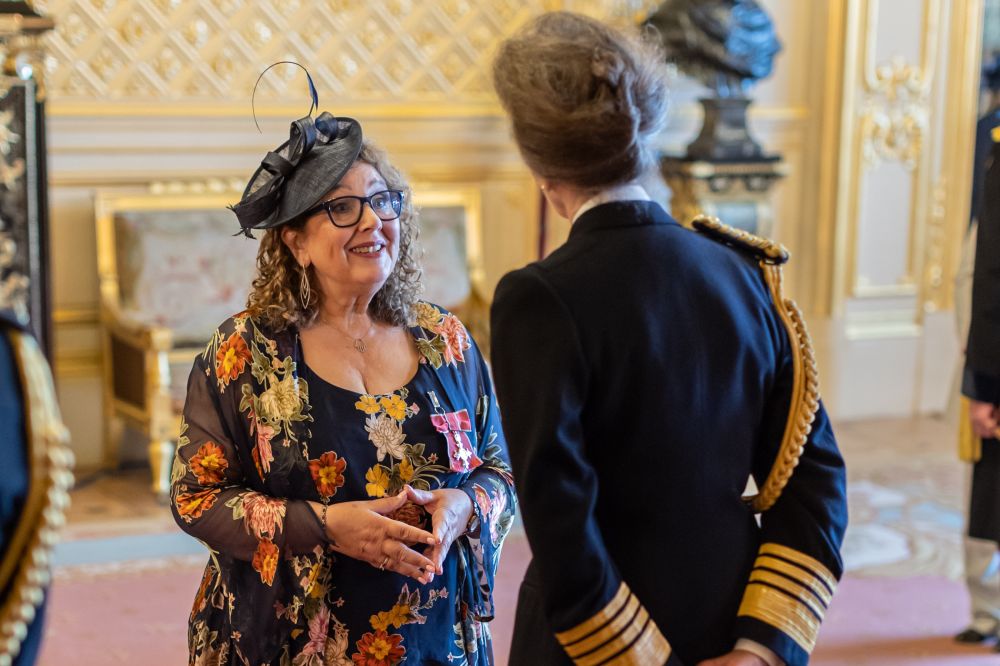
LT: Finally, congratulations on your recent MBE for outstanding service to Humanitarian Aid in the UK and overseas.
RB: It was a wonderful honour. A little piece of my MBE goes to all the people who have helped me on this amazing journey. I’ve learnt so much and I’ve been helped so much. And now, as I approach my 70th birthday and 10 years of Goods For Good, there’s still a huge need in the world and so much potential to be kind to people and our planet.
For further information on Goods For Good, please click here.






